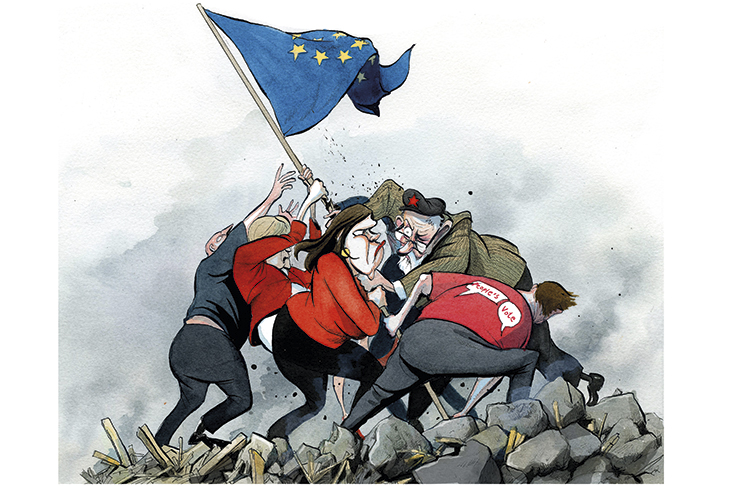Ever since the Brexit referendum, the two strongest political forces in Britain have been Leave and Remain. Loyalty to political parties has faded, but feelings about the referendum result are almost stronger now than they were on June 23, 2016. For Remainers, these are tense times: for years, there has been the hope of a second referendum and stopping Brexit. But if the Tories win a majority next month, then the UK will leave the European Union on January 31 and our future relationship with the EU will be negotiated by the man who led the Leave campaign. By the time of the next general election, Brexit will be a settled fact.
If Remainers could organize themselves into a single political force, they would be almost unstoppable: 45 percent of the public identify as Remainers, easily enough to win a majority under first past the post. Leavers are about 41 percent, while only 26 percent of voters describe themselves as Tory and 23 percent as Labour. A great many Remainers intend to stick together: as Matthew Parris has said, a new group of voters have formed a ‘band of brothers’. The cause will endure for them, long after Brexit.
But the Remain side has been unable to unite behind any one party or leader. This is a particular problem for them now that Boris Johnson is the Tory leader. He has largely succeeded in the mission for which he was elected: to make the Tories into an indisputably Leave party and to crush support for Nigel Farage’s Brexit party. Every Tory candidate is now signed up to leaving the European Union with Boris Johnson’s deal, while the doubters have been rather brutally cast out. An extraordinary 71 percent of those who backed Brexit in 2016 are now voting Tory. Yet on the Remain side, no party can command the support of half of those who voted to stay in back in 2016. In our first-past-the-post electoral system, this asymmetry could prove fatal to Remain.
There have been attempts to form a Remain alliance: the Liberal Democrats, the Greens and Plaid Cymru have stood down for each other in about 60 seats. But this pact is only likely to make a difference in a handful of places: any Remain alliance that doesn’t include Labour is Hamlet without the Prince. Even when it comes to tactical voting, there is no single Remain voice, no one group from which to take advice. There are at least three different sites advising Remainers on how best to use their vote.
The prospect of Remain tactical voting is much more worrying to cabinet ministers than the Labour party is. If this election sees a split in the center left, then the Tories will end up with a comfortable majority. But if all Remainers vote tactically, then Boris Johnson will fall short of the numbers he needs.
The very fact that we are having an election demonstrates the limits of Remain unity. Boris Johnson was trapped in parliament, unable to pass his Brexit deal unamended. But he got the election he wanted when the Remain opposition’s united front against an election cracked. The Lib Dems and the Scottish Nationalists both decided to go for a December election, thinking the timing would work best for them. Labour ended up with little option but to embrace the idea. Time and time again, partisan advantage has proven fatal to the idea of a full-blown Remain alliance.
The other problem is Jeremy Corbyn. He is determined to maintain ambiguity in Labour’s Brexit position, so as not to alienate the Brexit voters currently being targeted by the Tories. This position is often embarrassing for him when he’s asked to spell it out. He says that he wants to negotiate his own deal, then have a referendum but — remarkably — he won’t say which side he’ll back in that vote. In his television debate with Boris Johnson, he risked ridicule by repeatedly refusing to answer this question. The Liberal Democrats are quite right to say that under Corbyn, Labour is not a Remain party.
Aside from anything else, Remainers might find Corbyn’s political agenda too much to stomach. If Jo Swinson said that she would be prepared to put Corbyn in No. 10, she would end her chances of picking up Tory/Lib Dem marginals such as Cheltenham and Winchester. There are many voters who would prefer to remain in the EU but don’t think that a Corbyn premiership is a price worth paying. Of the Remainers who voted Tory last time, three in four regard a Corbyn premiership as worse for the country than Brexit. About a quarter of those who voted Lib Dem take that view too.
This is not just about Corbyn’s economics either. His desire to expropriate 10 percent of all large companies, to nationalize industries at a price set by parliament and to take the intellectual property of pharmaceutical companies are all problematic. Yet vastly more difficult than that is his attitude to anti-Semitism. Corbyn is a man who has invited to tea on the House of Commons terrace Raed Salah, a man who has spread the ancient libel that Jews mix their bread with the blood of gentile children. One can see why Swinson doesn’t think Corbyn is fit to be prime minister.
Jeremy Corbyn is Remain’s fundamental problem in this campaign. The most effective strategy for denying the Tories a majority for their Brexit deal would be mass tactical voting. But that would involve a lot of non-Labour people having to vote for Corbyn’s candidates and risk him ending up in Downing Street. Hence the problem: there can be no effective Remain alliance without Labour, but there can be no Labour involvement without Corbyn.
With three weeks to go, there are a few reasons for Remain to be hopeful still. The last election showed that in Scotland, voters are capable of working out how to vote tactically without any great central direction. The unionists united behind the candidate most likely to beat the SNP, to the delight of the Tories. If English Remainers prove as adept at tactical voting, then the Tories can forget their hopes of a majority. The approach of election day may concentrate minds. If it looks as if the Tories are heading for a comfortable majority, Remainers will start to imagine what this means. That might prompt a last-minute flurry of tactical voting.
The reason the stakes are so high is because the Remain faction in the Commons have refused to compromise since the referendum. At pretty much any point in the last parliament, they could have secured a soft Brexit. They could have engineered a deal that would have kept the UK in the customs union and made it follow EU rules in a host of areas. But they chose not to do that, betting everything on securing a new referendum and stopping the whole thing. They may well succeed in that. After all, the Tory Brexit ultras rejected the compromise that was the May deal, and are now on the verge of getting the much cleaner Brexit that they wanted.
If the Remainers fail, though, they will have no safety net. The UK will leave the EU with the ability to diverge from EU rules. This will make it that much harder to make the argument for rejoining, as the more the UK diverges from the EU, the more economic dislocation will be involved in going back in. It will be a much harder sell, as it would involve giving things up and transferring powers back to Brussels (most likely with no rebate on the annual fee). A campaign to rejoin would have to explain how Britain would get around the obligation on new EU members to adopt the euro as their currency. Most of all, it would have to persuade a public that is fed up with interminable negotiations with Brussels to embark on yet more. This doesn’t mean that rejoining will never happen — leaving the EU was once regarded as a very unlikely proposition — but it is hard to see it happening soon.
The rearguard action fought by Remainers since their referendum loss has been remarkable. But if the new parliament backs Boris’s Brexit, their cause will be lost. And this is where they will end up, unless they can find a way to turn things around in the next three weeks.
This article was originally published in The Spectator’s UK magazine. Subscribe to the US edition here.



















